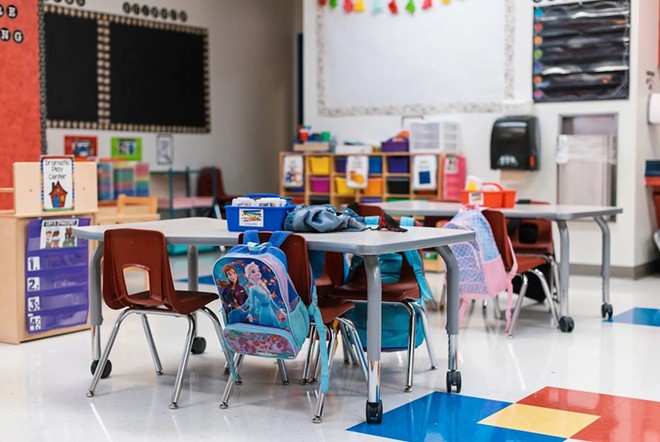
Texas Tribune / Jordan Vonderhaar
College students’ backpacks grasp off the again of their chairs in an empty classroom at Blanco Vista Elementary Faculty in San Marcos on Monday August, 23, 2021.
Questions on how a voucher program would — or wouldn’t — serve kids with disabilities took heart stage at a Texas Senate training committee listening to Tuesday to debate the principle faculty voucher invoice on the desk through the Legislature’s newest particular session.
Senate Invoice 1, authored by Sen. Brandon Creighton, R-Conroe, would use taxpayer {dollars} to create training financial savings accounts, a voucher-like program that may give households entry to $8,000 a 12 months to pay for personal faculty tuition and different academic bills.
Voucher proponents argue that training financial savings accounts would enable college students with disabilities entry to specialised colleges if public colleges are usually not assembly their wants. Opponents, nevertheless, have identified that non-public colleges, not like public colleges, are usually not required by legislation to supply particular training providers.
Some incapacity advocates have raised considerations about funneling public {dollars} into personal colleges when the state’s public faculty system, which serves most particular wants college students in Texas, stays underfunded. The variety of college students with disabilities in Texas has elevated by 200,000 within the final 5 years, in response to Steven Aleman, coverage specialist at Incapacity Rights Texas.
“Our public faculty enrollment is rising. Our particular training inhabitants is rising,” Aleman testified Tuesday. “We have to deal with supporting that system at the start, and [education savings accounts], fairly frankly, are only a luxurious we can not afford.”
SB 1 notes that non-public colleges are usually not topic to laws specified by the federal People with Disabilities Schooling Act, which requires public colleges to supply key providers to college students with disabilities, mentioned Sabrina Gonzalez Saucedo, public coverage analyst for the Texas Council for Developmental Disabilities.
“This features a proper to free and applicable public training, to be evaluated and to have a diagnostician go over findings, individualized education schemes and different actually necessary protections underneath the legislation,” Gonzalez Saucedo mentioned. “We’re actually involved that oldsters and college students are going to be dropping these rights ought to they take a voucher.”
Gonzalez Saucedo, whose sister has an mental incapacity, mentioned one other concern is that vouchers might create “segregated training” between disabled and non-disabled college students. College students with disabilities usually profit from the possibility to be taught and play alongside non-disabled friends, and vouchers would possibly incentivize mother and father to separate their kids, she mentioned.
Mandy Drogin, marketing campaign director of an training initiative for the conservative assume tank Texas Public Coverage Basis, argued the alternative. Drogin mentioned she just lately heard from a mom whose son with Asperger’s syndrome tried to take his life after repeated bullying in public faculty for his incapacity.
“I’ve heard 1000’s of oldsters begging for the chance to talk for his or her little one and unchain them from a faculty that’s not serving them,” Drogin mentioned.
However even when given the possibility to attend a non-public faculty, incapacity rights advocates raised considerations that non-public colleges will merely not admit kids with disabilities. And personal colleges, particularly for college kids with disabilities, are sometimes in city areas and have tuition charges upwards of $20,000 yearly, in response to Jacquie Benestante, government director of the Autism Society of Texas.
Benestante, whose son has autism, mentioned a non-public faculty in Austin refused to take her son for its summer season camp when he was in elementary faculty.
“He has very low-support wants,” she mentioned. “He’s a really effectively behaved child, and so they truly advised me, ‘Name again in Might. If we do not have sufficient common children, we’ll take him.’”
Sen. José Menéndez, D-San Antonio, mentioned personal colleges’ capacity to disclaim candidates at their discretion might have an effect on all voucher recipients, even those that are usually not disabled.
“If one among my constituents, who possibly falls underneath that class of economically deprived [and needing a] free or lowered lunch, and so they get their hopes up and so they go and apply to that non-public faculty, however they [are] turned away as a result of possibly they don’t seem to be the correct faith or the correct shade — that’s why I am involved as a result of these are tax {dollars},” Menéndez mentioned.
Creighton mentioned any considerations about discrimination in personal faculty admission ought to be taken up in a separate piece of laws.
“Though I perceive your considerations that non-public colleges have the flexibility to approve or deny primarily based on that framework inside that non-public faculty, mothers and dads can be a lot smarter than us, as senators, in selecting the college that’s finest for his or her little one,” Creighton added.
Democratic lawmakers on the committee additionally raised considerations concerning the invoice’s prioritization tiers.
To prioritize entry to underprivileged teams, the invoice proposes that not more than 40% of spots are reserved for college kids who obtain free or lowered lunch; not more than 30% to households who who earn between 185% and 500% of the federal poverty line; not more than 20% to college students with disabilities; and 10% to all different candidates who attended public, personal or home-school within the final faculty 12 months.
Menéndez mentioned the “not more than” language implies there can be a cap on how a lot funding goes to underprivileged candidates, as an alternative of prioritizing them.
Professional-voucher advocates — together with Laura Colangelo, government director of the Texas Non-public Faculties Affiliation, and Jennifer Carr Allmon, government director of the Texas Catholic Convention on Bishops — additionally supported altering this language to verify this system would distribute as a lot funding to low-income or disabled college students as potential.
Disclosure: Texas Non-public Faculties Affiliation and Texas Public Coverage Basis have been monetary supporters of The Texas Tribune, a nonprofit, nonpartisan information group that’s funded partially by donations from members, foundations and company sponsors. Monetary supporters play no position within the Tribune’s journalism. Discover a full record of them right here.
This text initially appeared within the Texas Tribune.
The Texas Tribune is a member-supported, nonpartisan newsroom informing and interesting Texans on state politics and coverage. Be taught extra at texastribune.org.
Subscribe to SA Present newsletters.
Observe us: Apple Information | Google Information | NewsBreak | Reddit | Instagram | Fb | Twitter| Or join our RSS Feed





